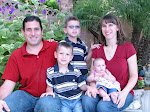Carroll: It’s like purposefulness versus randomness.
Lindelof:. That’s right. It’s order versus chaos, which is what it always was. But first it had to start as science versus faith, because Jack is a doctor and Locke is a guy who got up from his wheelchair and walked. Now the question has been boiled down to its essential root—is there a God or is there nothingness?
Carroll: Presumably, if it is order versus chaos or purpose versus randomness, there is no right answer. It’s not as if in the finale you’re going to say, “Yup, it was order.”
Cuse: I don’t think there’s a right answer.
It is a frightening thought to consider that we can't really answer the question of purpose vs. randomness or even God vs. nothingness. This is why Leslie Newbigin suggests that post-modernism actually leads to nihilism. Well, Lost is the quintessential postmodern experience.
The vestige of modernism that continues to hold sway over post-modernists is the definition of knowledge. Moderns defined knowledge by what could be empirically proven. In this environment, science became king. Faith was okay, if you needed that sort of thing, but don't mistake it for knowledge! Post-modernism rejects the arrogant confidence of scientific empiricism, but still allows their conception of knowledge to be defined by it, which is why when pushed to its extreme, true knowledge becomes unattainable. In other words, post-modernists agree with moderns that knowledge requires empirical proof, but disagree that even science itself has reached that level on life's biggest questions.
The result is that a post-modern world-view will the hold metaphysical questions of life, such as those portrayed in Lost, as unanswerable. Post-modernists will not ascribe to science omnipotence as moderns did, but simply believes attempts at answers to be futile.
A Christian world-view does not counter by insisting that God is empirically provable, but rather suggests all knowledge involves a commitment, which is to walk by faith. It grounds knowledge/wisdom in the being of God himself. Certainly, Christianity needs to show itself to be intellectually viable (which it is), but it does not bear the burden of the "modern" definition of knowledge. Post-modernists are correct that the biggest questions in life cannot be answered with empirical knowledge. It does not follow, however, that there are no answers!

No comments:
Post a Comment